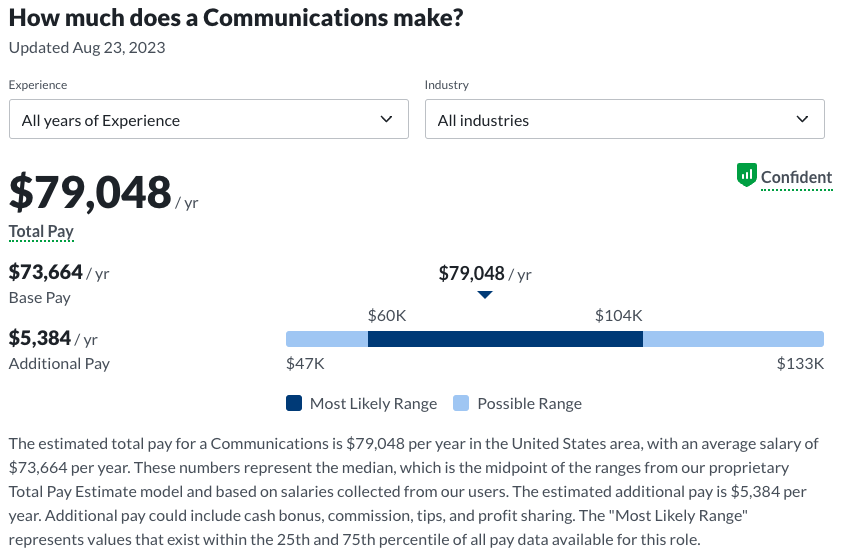Communications Degree: Pros and Cons, and Everything In Between
Mastering the art of effective communication, captivating audiences, shaping narratives, and making an impact with your words lies in finishing a communications degree. Imagine a world where your voice is heard, your messages resonate, and your ideas inspire change.
Welcome to the realm of a communication program, where every conversation becomes an opportunity and every interaction holds the power to shape the course of society.
In this fast-paced, interconnected world, effective communication is the key to success. Whether you’re navigating the realms of business, politics, media, or public relations, a communication degree equips you with the tools to excel. You’ll delve into the intricate world of interpersonal dynamics, mass media, and digital platforms, understanding how messages are crafted, transmitted, and interpreted.
But it’s not just about theory. A communication degree opens doors to practical experiences that shape your skills and understanding. You’ll engage in lively debates, tackle real-world case studies, and participate in immersive internships, all while honing your ability to analyze, synthesize, and articulate ideas with clarity and precision.
What is a Communications Degree?

Imagine yourself in the center of a busy newsroom where reporters are busy uncovering stories that influence public opinion. Or imagine yourself strategizing behind the scenes of a political campaign, crafting messages that sway the minds of voters. Perhaps you see yourself in the digital realm, skillfully managing social media campaigns that ignite viral sensations.
A communication degree is one of the choices that will allow you to do so. This degree refers to a program of study that focuses on developing effective communication skills, strategies, and theories across various mediums and platforms. It equips students with the knowledge and expertise needed to excel in diverse fields such as journalism, public relations, advertising, marketing, digital media, and corporate communications.
Benefits of a Communications Degree
Taking up a communication program offers numerous benefits that can positively impact your personal and professional lives. Here are some key advantages:
- Effective Communication Skills: A communications degree hones your ability to articulate ideas, thoughts, and messages clearly and persuasively. This invaluable skillset enhances your interpersonal relationships, boosts your confidence in public speaking, and empowers you to express yourself effectively in any context.
- Versatility: Communication skills are essential in nearly every industry and profession. With a communication degree, you can pursue a wide range of career paths, including journalism, public relations, advertising, marketing, corporate communication, social media management, event planning, and more. The versatility of the degree allows you to adapt to evolving job markets and explore diverse opportunities.
- Professional Networking: Throughout your studies, you’ll have opportunities to connect with professors, industry experts, and fellow students who share your passion for communication. These connections can lead to internships, mentorships, and valuable professional contacts that may open doors to future career prospects.
- Adaptability in the Digital Age: In today’s digital landscape, effective communication extends beyond traditional mediums. A communication program equips you with knowledge and skills in digital communication platforms, social media management, content creation, and online engagement, preparing you for the demands of the ever-evolving digital age.
- Cultural Sensitivity and Global Perspective: Communication is essential in a diverse and interconnected world. By studying communication theories and exploring various cultural contexts, you’ll develop a greater understanding of different perspectives, enhance your cultural sensitivity, and become a more empathetic and inclusive communicator.
Career Path for Communications Graduates
With a communications degree in hand, graduates can embark on a diverse range of career paths. Here are some potential job opportunities for individuals holding a communications degree:
Communications Specialist
If you’re someone who’s interested in communication strategies, managing internal and external communications, and ensuring consistent messaging across different channels, then pursuing a career as a communications specialist is an excellent choice.
You will have to work closely with internal and external teams for corporate communication and develop communication strategies that align with organizational goals. In addition, you will have to write and edit content pieces and manage the organization’s campaigns. This is to build and maintain relationships with customers, media outlets, journalists, and influencers
Public Relations Specialist/Manager
In this role, you’ll handle the public image of an organization, develop PR campaigns, handle media relations, and manage crisis communications. You will also develop and execute PR strategies that enhance brand visibility, build positive relationships, and craft press releases, speeches, and other PR materials.
In addition, a public relations specialist will also be tasked with monitoring and managing an organization’s online reputation through social media and online platforms. To be successful in this role, you will have to collaborate with internal teams, such as marketing and communications, to ensure consistent messaging across all platforms.
Marketing Coordinator
As a marketing coordinator, you’ll assist in the creation and implementation of marketing plans, conduct market research, coordinate advertising efforts, and track campaign performance. This role allows a person to support and execute the marketing teams in an organization.
To be successful in this role, you will need to be well-versed in different types of channels, such as digital, print, and social media. You also need to have a good background in researching target audiences, trends, and competitors.
Job Outlook After Completing Communications Degree

The job outlook for individuals in communication occupations is promising. The demand for communication professionals continues to grow as organizations recognize the importance of effective communication in today’s digital age. With the rise of social media and the increasing need for a strong online presence, professionals with excellent communication skills are highly sought after.
According to the Bureau of Labor Statistics, the growth rate from 2021 to 2031 for communications career paths is around 6%. Here’s a screenshot from the website:
Average Salary of Communications Graduates

The earning potential for individuals with a communications degree varies depending on the specific career path and level of experience. Generally, communications graduates can expect competitive salaries. According to Glassdoor, the average salary for professionals in communication-related roles ranges from $60,000 to $104,000 per year. However, salaries can be higher for individuals in managerial positions or those with extensive experience in the field.
Here’s a screenshot of the salary range provided by Glassdoor:

Job Satisfaction of Communications Graduates

Many communications degree holders report high levels of job satisfaction. With the ability to work in diverse industries and pursue different roles, communications graduates often find their job prospects rewarding.
Real-World Examples: How do Communications Graduates Fare in the Real-World?
To gain a deeper understanding of the real-world impact of a communications degree, let’s explore these examples from Reddit:
Salary for director of communications?
Here’s a thread about the salary of a director of communications.
Is a communications degree worth it?
In another thread, the OP wanted to know whether this degree was worth it. Check out the comments to learn more:
If I get a communications degree can I get a job in advertising.?
If you’re wondering whether you can get a job in advertising with a communications degree, here are the answers from some Redditors:
What can I do with a communications degree?
Here is a thread where Redditors talk about what a graduate can pursue after finishing a communications degree:
Is a Communications Degree for You?
Knowing whether you align with a communication degree is important to know if you can pursue this degree. Here are some factors to consider to determine whether you’re fit for the degree:
| YES | NO | |
| INTEREST: Do you have a genuine interest in communications? | ||
| JOB PROSPECTS: Are there good job opportunities in the field of communications? | ||
| REQUIRED SKILLS: Do you possess the necessary skills to become a bioengineer? | ||
| CURRICULUM: Is the communications curriculum something that you would like to pursue? | ||
| COST: Will the cost of pursuing a communication degree fit within your budget? | ||
| TIME COMMITMENT: Are you willing to commit the required amount of time to complete a communication program? | ||
| PREREQUISITES: Have you completed the prerequisite courses necessary for the communications program? | ||
| ACCREDITATION: Is the communications program accredited by the relevant authorities? | ||
| FACULTY: Do you believe the quality of the faculty teaching the communications program is satisfactory? | ||
| CAREER GOALS: Does obtaining a communications degree align with your long-term career goals? |
Choosing the Best School for Your Communications Degree Education
When choosing a school for your bachelor’s degree in communications, there are some factors you need to consider. This includes curriculum, accreditation, and faculty quality. You need to look for a school that can offer hands-on learning opportunities using medical equipment and access to internships with their degree programs.
Curriculum
Knowing the curriculum of the communications major before enrolling is important. This allows you to know what subjects you’ll be able to take and which specializations are available for you.
In addition, it also helps you to carefully tailor the course you’re taking, which means you’ll get to pick the subjects that perfectly align with your interests.
Most schools display their curriculum for a communications major online. So, you might want to check out the site to learn more.
Accreditation
Another factor to consider is the accreditation of the school you’re going to. You’d want to pick schools with accreditation from reputable organizations. This means you’re getting into a school that has passed the rigorous requirements of accrediting organizations.
Faculty Quality
In addition, you also need to check out the faculty’s quality. A strong faculty would be a team of communication professionals with broad knowledge of its concepts. You’d also want to check out the credentials of the faculty to ensure that they really know what they’re teaching.
Cost of Education
The cost of education is another crucial factor that will affect your decision. If the school or university offers expensive courses but their faculty quality, accreditation, and curriculum are not up to your standards, then you should immediately cross that school off your list.
When deciding which school to pick, always ensure that the cost aligns with the curriculum offered, current accreditations, and faculty quality. This is to ensure that you get what you paid for.
Pros and Cons of a Communications Degree
Like any educational path, communication programs have their advantages and disadvantages. Here are some pros and cons to keep in mind:
Pros:
- Versatile skill set applicable to various industries
- Opportunities for creativity and storytelling
- High demand for communication professionals
- Potential for career growth and advancement
Cons:
- Competitive job market
- Fast-paced and ever-evolving industry
- Need to keep up with emerging technologies and trends
- Varied work environments and schedules
FAQs About the Communications Degree
Can I pursue a bachelor’s degree in communication degree if I’m not a natural extrovert?
Absolutely! Effective communication is not limited to extroverts. Communication majors help develop a wide range of skills, including listening, writing, research, and critical thinking, which are valuable regardless of your personality type.
What industries can I work in with a communications degree?
Communication programs open doors to various industries such as media, advertising, public relations, corporate communications, nonprofit organizations, government agencies, and more.
Do I need to specialize in a specific area within communications?
While specialization can provide a focused career path, a broad-based communication degree can offer flexibility and adaptability across different industries. It ultimately depends on your interests and career goals.
What communications skills will I gain from a bachelor’s degree in communication degree?
Communication programs equip you with skills such as effective written and verbal communication, corporate communication, communication methods, organization methods, organizational communication, media relations, strategic planning, critical thinking, storytelling, research, and social media management.
Can I pursue a postgraduate degree after obtaining a bachelor’s degree in communication cegree?
Absolutely! Many individuals with a communication degree go on to pursue postgraduate degrees such as a master’s or doctoral degree in public relations, journalism, marketing, or business administration to further specialize in their chosen field.
Final Verdict
A communication degree offers a world of opportunities for individuals passionate about effective communication. Whether you envision yourself as a communications specialist, public relations manager, marketing coordinator, or pursuing any other communication-related career, this degree provides a solid foundation for success.
Salary | Score: 5.5/10
The salary of graduates with communication degrees can vary based on factors such as experience, industry, and job role. On average, entry-level professionals can expect to earn between $47,000 and $60,000 per year. However, as you progress in your career and gain experience, salaries can increase significantly, with mid-career professionals earning around $60,000 to $104,000. This is the reason why I gave it a score of 5.5 out of 10.
Satisfaction | Score: 7/10
Job satisfaction among graduates of communication degrees is generally high. The ability to use their creativity, storytelling skills, and strategic thinking in their daily work contributes to a sense of fulfillment. So, I gave it a score of 7 out of 10.
Demand | Score: 6/10
The demand for communications professionals remains strong in today’s digital age. With the rise of social media, the need for skilled communicators who can navigate the digital landscape and effectively engage with audiences has grown exponentially. According to the BLS, the growth rate is around 6% from 2021 to 2031. With this, I gave it a score of 6 out of 10.
X-Factor | Score: 8/10
The unique factor that sets the communication degree apart is its versatility. Graduates can apply their skills and knowledge to a wide range of industries and job roles. From media and journalism to public relations, advertising, marketing, and digital media, a communications degree opens doors to diverse career paths. The ability to adapt to different mediums and platforms, combined with strong communication skills, gives communications graduates a competitive edge in the job market. This is the reason why I gave it a score of 8 out of 10.

Final Score for the Communication Degree: 6.625
Considering the demand, job satisfaction, salary potential, and versatility, the Communication Degree earns a final score of 6.625. Its ability to provide graduates with a solid foundation in effective communication, coupled with the diverse range of career opportunities, makes it an excellent choice for individuals passionate about making an impact through communication.
Alternatives to Communication Degree
While a Communication Degree offers numerous benefits, it may not be the ideal choice for everyone. Here are some alternative degree options to consider:
- Journalism degree
- Public Relations degree
- Marketing degree
- Media Studies degree
- Advertising degree
- English degree
- Business degree with a focus on communication
- Digital Media degree
- Film and Television Studies degree
- Creative Writing degree
So, is a communications degree worth it? Check this video out!
